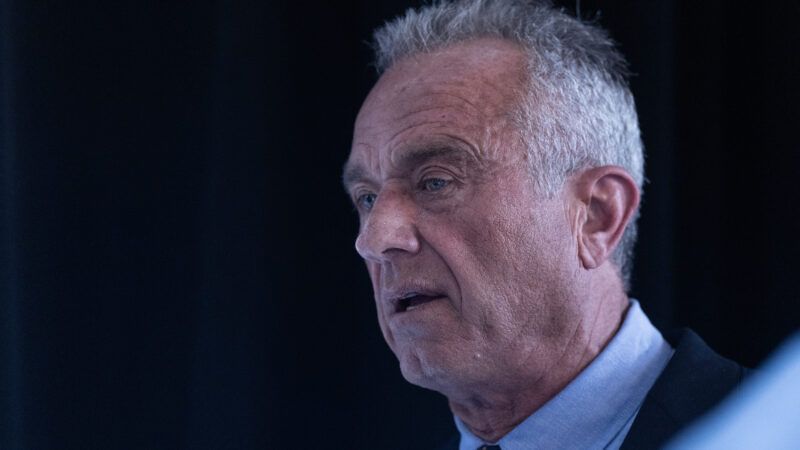There's No Good Reason to Keep RFK Jr. Off the Debate Stage
I thought democracy was at stake?

Tonight's the night: President Joe Biden and former President Donald Trump will face off on the debate stage—though they might spend more time arguing with the moderators than with each other. CNN's Jake Tapper and Dana Bash are slated to grill the candidates, whose microphones will be muted when it's the other person's turn to speak. This means Trump and Biden won't be able to talk over each other—a good thing, broadly speaking—but they may not be able to engage in much cross-chatter at all.
Under such conditions, the debate might simply feel like two separate interviews, with the candidates fielding different questions from the moderators and interacting very little. Only time will tell.
That said, the most serious problem with this first debate is that it's missing a candidate: Robert F. Kennedy Jr, whose independent bid for the presidency has attracted a non-negligible base of support. There is no good reason to exclude RFK JR. from the debate—the voters deserve to hear from him, too.
Arguments that RFK Jr. has failed to garner significantly high poll numbers to justify inclusion in the debate ring especially hollow this year, given that Biden, Trump, and CNN have agreed to throw out the rule book. Indeed, for the first time in my lifetime (i.e., since 1988), the Commission on Presidential Debates—the nonprofit group that organizes the debates—is out of the picture.
Libertarians will recall the commission's rules stated that candidates were eligible to appear in the debate if they had cleared a 15 percent support threshold in presidential polls. This meant that Gary Johnson, the Libertarian Party's presidential candidate in 2016, was absent from the Trump-Clinton debates—despite receiving 13 percent approval in some polls.
There's nothing sacred about the 15 percent figure; it's an arbitrarily determined hurdle to clear. Having bucked the commission, the candidates and the network could have come up with different rules. They've certainly agreed to do some things differently: the aforementioned microphone situation, no live audience, an earlier-than-anticipated debate date, etc.
But, no. CNN announced last week that RFK Jr. had failed to meet the network's criteria: at least 15 percent in four reputable polls and ballot qualification in enough states to theoretically win 270 electoral votes. The Kennedy campaign has contested this second aspect by noting that neither Trump nor Biden are technically eligible under this criterion, since their respective parties have not yet officially nominated them. As for the polls, RFK Jr. has exceeded the (entirely arbitrary) 15 percent threshold in three of them, according to Politico. He's damn close in several others.
The real reason CNN is excluding RFK Jr., of course, is that Trump and Biden steadfastly refused to appear alongside him. The major party candidates agree on very little, but one thing they do agree on is that they should not have to share the stage with anyone else. That was their deal with CNN, and CNN has dutifully obeyed, according to The New York Times.
"They want it to be just the two candidates and the moderator—without the raucous in-person audiences that Mr. Trump feeds on and without the participation of Robert F. Kennedy Jr. or other independent or third-party candidates," reported The Times in May.
Reading between the lines, it sounds like Biden and Trump wouldn't have participated in a debate with RFK Jr., and thus CNN was always going to establish some criteria that wound up excluding Kennedy. The mainstream media insists that democracy itself is at stake in this election, but they won't give voters an opportunity to hear from the highest-polling third-party candidate in 30 years.
Debate Flashback
Reason's Matt Welch revisited the first Trump-Biden debate in 2020, noting that Trump's positions on the pandemic look considerably more compelling from the vantage point of 2024—especially when compared with Biden, whose subsequent administration continued and intensified the most intrusive COVID-19 mitigation efforts.
"Biden's CDC recommended universal congregate-setting masking—like, for two-year-olds—well into 2022, based on the flimsiest of evidence," writes Welch. "He imposed vaccine mandates, inaccurately characterized the disease as a 'pandemic of the unvaccinated,' and accused social media companies of 'killing people.' It's honestly not good for your blood pressure to remember any of this."
Similarly, I recently surveyed the last debate of the 2020 election cycle, which took place in October, just days after the release of The New York Post's infamous Hunter Biden laptop story. That story was widely suppressed on social media and branded as likely Russian misinformation by mainstream media. When Trump brought up the laptop during the debate, Biden also dismissed the story as obviously linked to Russian election interference; he cited the letter from 50 current and former national intelligence officials who had concluded that the laptop resembled a Russian disinformation campaign.
After Biden made the assertion, Trump appeared dumbfounded. "You're saying the laptop is another Russia, Russia, Russia hoax?" asked Trump incredulously. "You got to be kidding."
Four years later, no evidence has ever emerged that the laptop was part of a Russian influence operation. Russia hoax, indeed.
This Week on Free Media
I'm joined by Amber Duke to discuss CNN's treatment of a Trump spokesperson, The View's deference to teachers union talking points, MSNBC recoiling in horror at the term "illegal immigrant," and the media's reaction to Julian Assange's release from prison.
Worth Watching
Because I don't spend enough time arguing with people on television (that's a joke), I agreed to participate in a debate about immigration for the financial news site Zero Hedge. It was me and Libertarian presidential candidate Chase Oliver vs. conservative media figure Jack Posobiec and politico Ryan Girdusky—and things got heated.


Show Comments (33)